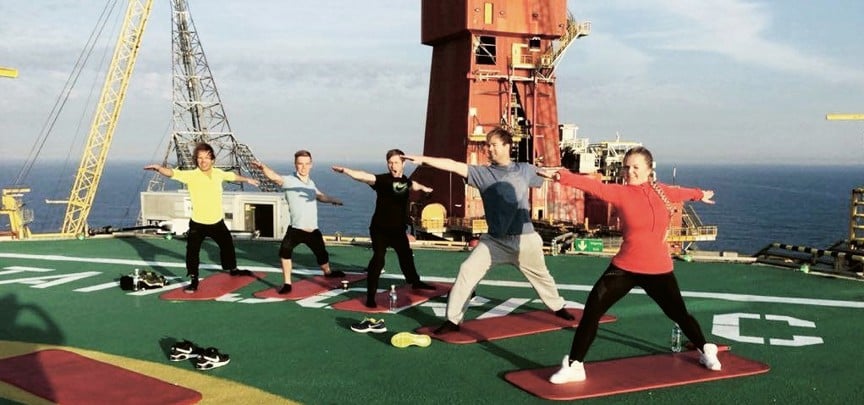Bente takes a helicopter to work
Employees on oil platforms in the North Sea take a helicopter to work and live in their own little universe for 18 weeks a year. Bente Fonnes knows more about that world than most people - she went aboard at the tender age of 18.

When hurricane winds are blowing and the waves are 20 meters high, the riggings rattle and the windows get covered with sea foam on the oil platform in the middle of the North Sea. Statfjord C has been pumping oil since 1984.
The platform is owned by Equinor, formerly Statoil, and can be manned by anywhere from 100 to 532 people. One of them is Coor employee Bente Fonnes, who has been an offshore worker for 36 years. She praises the camaraderie on the platform, saying life is never boring.
“There’s plenty to do in my time off. We have a well-equipped gym onboard and you can pursue all sorts of hobbies, like fishing, knitting, leather working and knifemaking.”

“The alarm can go off in the middle of the night”
Safety is a major concern on an oil platform. There are regular meetings about health, environment and safety, in which oil rig incidents – on their own and other rigs – are brought up as teaching moments. Twice a month they have structured evacuation exercises, but there are also unannounced drills.
“The alarm can go off in the middle of the night,” Bente says. “Then you’ve got to get into your survival suit and get to the lifeboat. All areas also have escape masks to put on in the event of smoke or fire.”
Once every four years, they even practice getting out of a helicopter that has crashed in the water.
“You do that in a simulator in a pool,” she explains.
Bente has never experienced a major dramatic event on board any of the oil rigs she’s worked on. But a few years ago she was in a scary incident with the helicopter.
“The helicopter rotor started leaking oil when we were on our way home. We had to land on a soccer field and wait for another helicopter to come and get us.”
Never wants to work on land
Bente cleans cabins, offices, the mess hall and common areas, and works in the laundry onboard. She’s used to the special life on the platform and plans to stay there until she retires. And life on the platform has provided more than an enjoyable job – she also met her husband there.
“It’s pretty common; many people here meet their partners at work,” she says.
The oil rig employees work for two weeks and are off for four. That means Bente and her husband can spend a lot of time together, whether at home in Stavanger, in their summer home on nearby Mosterøy Island, or in their house in Thailand.
“Employees on oil platforms are well paid,” Bente says, “but you do spend more money when you have so much free time. You have to watch your spending.”